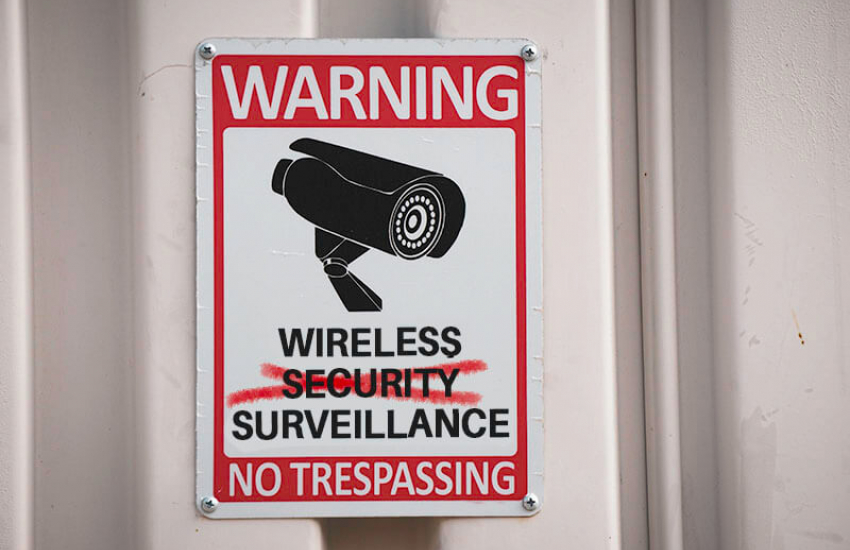Wireless Cameras: Are They Safe and What Are the Alternatives
Guest blog from ABP Technology
At ABP Technology, we have been selling network and security products for 21 years as a specialty distributor. We were thrilled to see WiFi for surveillance cameras and its promise to make installation easier for partners. We always knew wireless would not be totally safe and could be jammed, but we were not worried initially since the convenience and cost savings were important, and the risk seemed low.
Some wireless solutions are getting risky.
However, in the last years, jammers and other commercial products that disable the 2.4 GHz WiFi band got cheap and can be found on the Internet, making wireless less safe now.
There are two bands, 2.4 GHz and 5 GHz. Most consumer equipment manufacturers use 2.4 because it penetrates walls better. Typically, most professional installs on parking lots or outside cameras pointing back to buildings are 5 GHz point to point, will be more secure, and less prone to jamming or deauther devices technology attacks.
What started worrying us was when we saw the new combined wireless - alarm & video solutions pop up in the market.

They are simple to install, but can they be safe if they can be easily interfered with? The answer depends on what wireless technology the wireless alarm system uses for its sensors, door, and windows contacts. If they are WifFi 2.4, there is a real risk that these could easily be deactivated. If they use other systems like Ziggby Meshes, more sophisticated equipment is required to disable them. Also, most high-end companies are working on jamming detection algorithms and may trigger an alarm if they notice they are being jammed.
In summary, people always assume a certain degree of risk when using a wireless system. However, the risk for homes and apartments in practice is not high because most domestic robbers do their deeds on a spur-of-the-moment and usually don't come equipped with special equipment. It is different when a residence is a target for specific valuable items like artwork. The type of criminal that will attack here is someone that's very well prepared and has all kinds of tools to disable a wireless alarm system.
So it is fair to say that having a wireless alarm system for most is better than having no security at all, but a wired system is always safer.
Three suggestions for staying safe:

- Add an SD card to your cameras - that way, even if you can't see during the jamming, your camera records, and all can be seen in the camera later.
- Always change the default passwords of your cameras and write them down.
- Do NOT use port-forwarding on your router to connect to the cameras.
Port-forwarding is the technology that most people use to see their cameras, but it is also the least secure and the way most hackers get into people's networks and equipment.
ABPTECH sells to people that protect businesses. So naturally, we focus on them, and we are much more worried about companies. I would never use a wireless system in a business because people who break into a business will be much more prepared. They plan their deed and come with a truck and lots of equipment.
They know what they are coming for and have experience gathered at other similar places. They typically know what is of value and where to find it, the weak spots of that type of business, and exploit them. Be it tires, phones, or building materials. For them, the sign outside indicating a wireless security brand tells them what tools to use to disable the system.
For businesses, I recommend staying with a conventional wired alarm system with a monitoring company that will call the police for you. Today, most police departments want owners to video or audio-verify their site to make sure it's not a false alarm or they will not come. The cost for false alarms is
The best solutions we sell to our installers and resellers that give business owners surveillance visibility are professional Direct Cloud Camera solutions. We sell AlarmReady™ cameras from IPTECHVIEW. (You can look them up under AlarmReady.com)
These are wired cameras that safely connect to cloud storage and management. They are super easy to install because they ship preconfigured, and your Technology Partner or IT team can install them in minutes. The cameras store video both in-camera and in the cloud.
Cloud cameras from a professional player like IPTECHVIEW are designed for security and provide a safe encrypted tunnel from the camera to the cloud. The user will need two-factor authentication to access them. His phone will become his key, and he uses his face or finger to be recognized.
One AlarmReady™ camera is enough for you to get an SMS within seconds when the alarm at your place goes off.
The AlarmReady™ cameras will connect with any alarm system they tune in and trigger from your alarm siren's noise and offer a simple adapter to the alarm system for silent alarms.
What's cool is that you can start with one or two cameras for video verification solutions to prevent false alarms and ensure you get the police out.
In many cities, the police will not even come unless there is visual verification.
The user can later add more cameras and turn them into a complete IPTECHVIEW surveillance solution. He can also monitor multi-site businesses, and your staff can use the system for more than security employees.
In conclusion, think twice before going wireless, always add an SD card to record, and do not use cameras or surveillance systems that rely on port forwarding your router.
Talk to your reseller about AlarmReady cameras for business.
If you don't have a technology partner you trust we can send you some. Just fill our our find a partner form and we will send you a few local partners that sell IPTECHVIEW.


